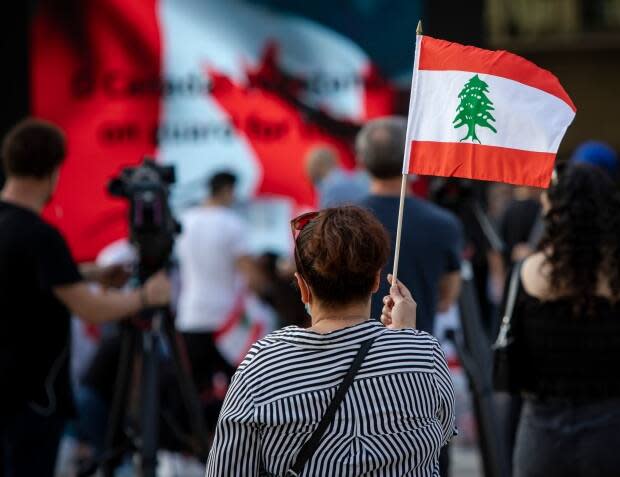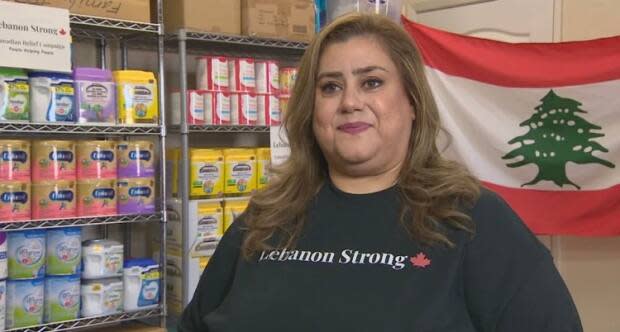Lebanese diaspora in Toronto remembers Beirut blast 1 year ago 'like it was yesterday'

For four minutes on Aug. 4, 2020, Jad El Tal thought his parents were dead.
Those minutes felt like hours to El Tal, who was in Toronto waiting for them to return his call from the Lebanese capital.
The explosion at the port of Beirut killed more than 200 people. It tore through his parents' neighbourhood two kilometres away and shattered their home. El Tal's uncle's home was also destroyed.
His loved ones' lives were spared. The emotional scars, however, live on a year later.
"Emotionally, it's shattering," El Tal, the director of research and policy at the Canadian Arab Institute, told CBC News.
"And you never really move on from or forget what happened especially because there hasn't been any justice or accountability measures in the last year."
Lebanon is marking the grim anniversary of the deadly blast as the country is mired in an economic crisis and a political stalemate. Across the Atlantic Ocean, the Lebanese community in Canada is still struggling with the devastation while working to rebuild and demanding justice from thousands of kilometres away.
In addition to the 214 dead — including two Canadians — the blast injured thousands, according to official records. Hundreds of tonnes of ammonium nitrate, which were haphazardly stored in the port since 2014, ignited after a fire broke out causing a tremor across the entire country.
WATCH | Beirut rocked by massive explosions
Community to send aid 'as long as Lebanon needs us'
Diala Lteif, a Lebanese urban planning PhD student who's lived in Toronto since 2016, also has vivid memories of what happened a year ago.
"I remember it like it was yesterday," she told Radio-Canada.
She saw the images of the explosion, called her friends and family to ensure they were alive and cried the whole day.

While the Lebanese community was shaken by the damage, emotions quickly turned into action with a particular focus on rebuilding.
Lteif organized an auction with the help of 20 Canadian artists who donated their works. All proceeds were sent to Lebanon to help rebuild homes and businesses.
Initiatives like it are still going a year later — in fact, they've actually multiplied with evolved priorities, according to Lteif.
There is now a large need for basic products, such as food, baby formula and medicine that many Lebanese can't get their hands on due to the unprecedented economic and financial troubles.
Dina Bakhit, a Lebanese-Canadian and philanthropist, is trying to alleviate those issues. She along with Hamsa Diab co-founded Lebanon Strong, which has sent in-kind donations worth $6.5 million in the past 10 months, according to the campaign.

Lebanon Strong is now fundraising to send 35,000 tins of baby formula to Lebanon but Bakhit acknowledges that more work needs to be done.
"Things are not changing for the better right now. They are even getting worse," she told Radio-Canada.
"We will not stop and we will continue to send aid as long as Lebanon needs us."
Canada's role in supporting Lebanon
El Tal has organized a campaign to get members of the Lebanese diaspora in Canada to write a letter to their MPs asking Ottawa to adopt a framework for targeted restrictive sanctions. El Tal says the federal government should aim those sanctions at those Lebanese officials who he says are engaging in corruption and obstructing the formation of a government.
Lebanon has been without a functioning government following Hassan Diab's resignation as prime minister days after the blast. The European Union has recently adopted the legal framework to impose sanctions on Lebanese officials and entities.
Canada should also increase funding to LGBTQ and women's organizations in Lebanon who haven't been able to access traditional avenues of aid, according to the letter.
Canada has provided $30 million in humanitarian assistance to Lebanon, the government says.
The letter also asks Canada to work with international allies and demand an investigation into the people responsible for storing the highly combustible nitrates at the port, and why officials ignored repeated internal warnings about them.
"The Lebanese who are grieving someone who they lost in the explosion can finally have some peace," El Tal said.
"I think they very much deserve that."

